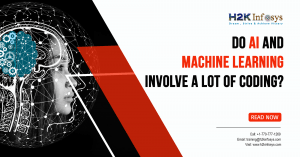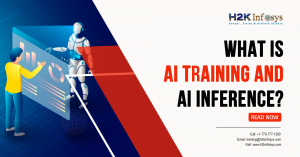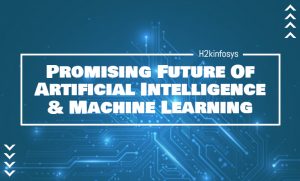Introduction: Why AI Careers Are Booming
Artificial Intelligence (AI) is no longer just a futuristic concept it’s today’s reality. From self-driving cars to smart assistants like Siri and Alexa, AI is transforming every aspect of life and business. As a result, the demand for professionals skilled in AI and machine learning is skyrocketing.
Organizations across industries are hiring AI talent to drive innovation, automate operations, and gain competitive advantage. Whether you’re a tech enthusiast, a data lover, or a complete beginner looking to switch Career Opportunities, the AI revolution holds exciting prospects for everyone.
This blog post explores the top career opportunities in Artificial Intelligence, how to prepare for them with AI course certifications, and why AI courses for beginners are the perfect starting point.

Machine Learning Engineer
What They Do:
Machine Learning (ML) Engineers design and implement algorithms that allow computers to learn from data. They build and deploy models used in facial recognition, predictive analytics, recommendation systems, and more.
Skills Required:
- Strong programming skills (Python, Java, R)
- Experience with ML frameworks like TensorFlow, PyTorch
- Knowledge of data structures and algorithms
- Understanding of statistics and probability
How to Get Started:
Enroll in AI and machine learning courses that offer hands-on projects. Earning an AI course certification enhances your resume and proves your skills to employers.
Data Scientist
What They Do:
Data Scientists use AI techniques to extract insights from structured and unstructured data. They help companies make data-driven decisions by building models, visualizing trends, and crafting narratives from numbers.
Skills Required:
- Proficiency in Python or R
- Data wrangling and data visualization skills
- Machine learning knowledge
- Ability to communicate complex findings clearly
Getting There:
AI courses for beginners are great for grasping basic AI concepts. Progress to advanced AI and machine learning courses to gain deeper expertise and certification.
AI Research Scientist
What They Do:
AI Research Scientists push the boundaries of artificial intelligence. They work on developing new algorithms, improving existing models, and publishing research papers.
Skills Required:
- Advanced math and statistics
- Strong research and analytical skills
- Deep knowledge of machine learning, NLP, or computer vision
- Familiarity with academic publishing
Educational Path:
Pursuing a Ph.D. or master’s in AI-related fields is often preferred, but a strong portfolio backed by an AI course certification can open doors.
Natural Language Processing (NLP) Engineer
What They Do:
NLP Engineers build systems that help machines understand, interpret, and generate human language. Examples include chatbots, sentiment analysis tools, and language translation software.
Skills Required:
- Linguistics and semantic analysis
- Knowledge of NLP libraries (SpaCy, NLTK, BERT)
- Python and deep learning frameworks
Career Opportunities Path:
Start with AI courses for beginners, followed by NLP-focused specializations in AI and machine learning courses.
Computer Vision Engineer
What They Do:
Computer Vision Engineers create systems that can interpret visual data such as images and videos. Applications range from facial recognition and augmented reality to medical imaging and autonomous vehicles.
Skills Required:
- Image processing techniques
- Deep learning (CNNs, OpenCV)
- Programming in Python/C++
How to Prepare:
Look for AI course certifications with modules in image processing and vision algorithms to build strong foundations.
Robotics Enginee
What They Do:
Robotics Engineers design and program robots that perform tasks with little to no human intervention. AI helps these machines perceive, reason, and interact with the world.
Skills Required:
- Control systems and embedded systems
- Robotics simulation (ROS, Gazebo)
- AI algorithms for decision-making
Learning Path:
Explore AI courses for beginners in robotics, then move to advanced courses integrating AI into robotic systems.
AI Product Manager
What They Do:
AI Product Managers bridge the gap between technical AI teams and business stakeholders. They guide the development of AI-powered products and ensure they align with user needs and business goals.
Skills Required:
- Product management experience
- Understanding of AI capabilities and limitations
- Communication and leadership skills
Certification Helps:
Even non-tech professionals can benefit from AI course certifications that provide conceptual understanding of AI workflows.
Big Data Engineer
What They Do:
Big Data Engineers manage and process massive volumes of data that power AI systems. They build data pipelines and infrastructure needed to train ML models.
Skills Required:
- Apache Spark, Hadoop, Hive
- Database systems (SQL, NoSQL)
- Python, Scala, Java
Building Your Skills:
Take AI and machine learning courses that include modules on big data ecosystems and engineering tools.
AI Ethicist / Responsible AI Specialist
What They Do:
AI Ethicists ensure AI systems are fair, transparent, and aligned with societal values. They assess risks, bias, and compliance with regulatory frameworks.
Skills Required:
- Knowledge of AI principles and bias detection
- Understanding of law, ethics, and social impact
- Communication and analytical thinking
Career Opportunities Tip:
This is a rapidly growing area. Start with AI courses for beginners focused on responsible AI and ethics.
AI Consultant
What They Do:
AI Consultants advise businesses on how to implement AI technologies effectively. They assess needs, design solutions, and help integrate AI into business strategies.
Skills Required:
- Technical knowledge of AI
- Business acumen and domain expertise
- Presentation and stakeholder management skills
Educational Requirements:
Certifications in AI-related areas and experience in business transformation projects are critical.
Industries Hiring for AI Roles
AI Career Opportunities are not limited to tech companies. Industries actively hiring AI professionals include:
- Healthcare: For diagnostics, drug discovery, and patient monitoring
- Finance: In fraud detection, risk management, and algorithmic trading
- Retail & E-commerce: For recommendation engines, chatbots, and inventory optimization
- Automotive: Autonomous vehicles and predictive maintenance
- Manufacturing: Smart factories and robotics automation
- Education: AI tutors, adaptive learning platforms
Benefits of AI Course Certifications
Pursuing an AI course certification has multiple benefits:
- Validates your skills and makes your resume stand out
- Provides structured, up-to-date knowledge from industry experts
- Often includes hands-on projects to build real-world experience
- Opens the door to higher salaries and promotions
- Suitable for both freshers and experienced professionals
Why Start with AI Courses for Beginners?
AI courses for beginners are designed to provide:
- A clear understanding of core AI concepts like supervised learning, neural networks, and data handling
- Introductory coding experience using Python
- A foundation in math and logic behind AI systems
- Small projects to build confidence and skills gradually
These courses are perfect for:
- Students in computer science or engineering
- Working professionals looking to upskill or switch Career Opportunities
- Business leaders seeking AI literacy to stay competitive
Tips to Succeed in an Career Opportunities
- Build Strong Fundamentals: Focus on mathematics (especially linear algebra and probability), statistics, and programming.
- Practice with Projects: Apply what you learn through mini-projects and real datasets.
- Join AI Communities: Platforms like GitHub, Kaggle, and AI forums can offer collaboration and learning.
- Keep Up with Trends: AI is evolving rapidly read research papers, attend webinars, and follow thought leaders.
- Earn Certifications: Enroll in recognized AI and machine learning courses to validate your expertise and get noticed.
Conclusion:
The world is on the brink of a massive AI-driven transformation. Those who equip themselves with the right skills and knowledge will have access to some of the most exciting, impactful, and lucrative roles of the 21st century.
Whether you dream of building smart machines, decoding data, or shaping ethical AI policies, there’s a role for you. With the rise in AI course certification programs and an abundance of AI courses for beginners, getting started has never been easier.
Take the first step today. Embrace the future. Your AI-powered Career Opportunities begins now.
Key Takeaways
- AI is transforming industries and creating diverse Career Opportunities paths.
- Roles like ML Engineer, Data Scientist, NLP Engineer, and AI Product Manager are in high demand.
- AI course certifications significantly boost your credibility and employability.
- Beginners can easily start with foundational AI courses and grow into advanced roles.
- Hands-on practice, continual learning, and industry engagement are keys to long-term success.
Ready to dive into the world of AI?
Start your journey with beginner-friendly AI and machine learning courses and earn your AI course certification to unlock exciting new career opportunities.


























